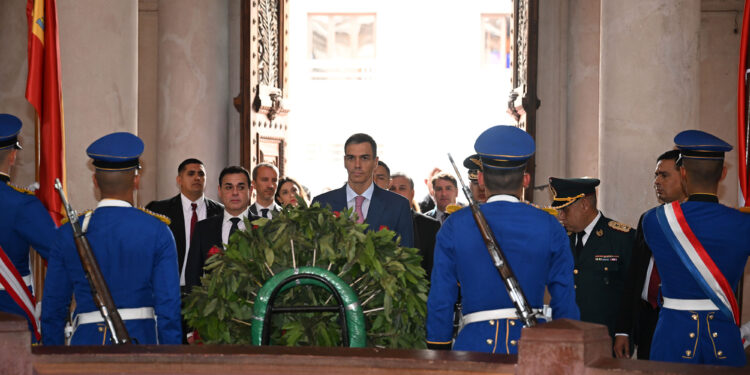González Barcos
Spanish Prime Minister Pedro Sánchez concluded his South American tour this Wednesday in Paraguay with a day rich in diplomatic symbolism, economic ambition and political resolve. Following stops in Chile and Uruguay, Sánchez chose Asunción to reaffirm Spain’s commitment to a more integrated Latin America, delivering a message rooted in regulated cooperation, economic diplomacy, and a firm defence of the long-delayed EU–Mercosur trade agreement.
The day began with a wreath-laying ceremony at the National Pantheon of the Heroes, where Sánchez paid tribute “to the Paraguayan people and their history of resilience,” as he later posted on social media. The ceremony marked the beginning of a packed institutional agenda. He was officially received with military honours by President Santiago Peña at the Palacio de López, the seat of the Paraguayan government.
During their bilateral meeting, the two leaders signed a circular migration agreement, aimed at facilitating the arrival of Paraguayan seasonal workers to Spain under a framework that ensures legality, labour rights and a voluntary return. The initiative, aligned with the EU’s strategy on regulated mobility, will allow hundreds of workers to be employed in sectors such as agriculture, hospitality and care services. “This is a win–win agreement that strengthens humane and orderly migration,” Sánchez stated after the signing.
Additionally, a cultural memorandum of understanding was signed to promote exchanges in fields such as the arts, language, and artificial intelligence applied to the cultural industries. Spain’s emphasis on cultural diplomacy was further underscored by Sánchez’s visit to the house-museum of Josefina Plá, the Canary Islands–born writer and artist who became a central figure in 20th-century Paraguayan culture. “Culture is a bridge between our peoples, and Josefina Plá embodies that bond with singular beauty,” the Prime Minister remarked.
On the economic front, the highlight was Sánchez’s participation in the Spain–Paraguay Business Forum, held in Asunción, where he was joined by a delegation of over twenty Spanish companies. Leading firms such as Sacyr, Aena, Renfe, and Indra were present, alongside SMEs in the energy, infrastructure, and tourism sectors. The President of the Spanish Confederation of Business Organisations (CEOE), Antonio Garamendi, led the business delegation, reaffirming the strong interest of Spanish industry in the Latin American market.
Sánchez encouraged companies to deepen their investment in Paraguay, citing its macroeconomic stability and potential as a regional platform for sustainable growth. He stressed the need for a foreign policy that aligns national interests with those of the private sector: “The best economic diplomacy is the one that creates shared benefits: growth for our companies and development for our partners.”
In that context, Sánchez once again made a strong case for the urgent finalisation of the EU–Mercosur agreement, whose political text was concluded in 2019 but whose ratification remains stalled. “Europe cannot afford to look the other way. This agreement is not just about trade—it is strategic for both blocs. It should serve as an instrument for prosperity, sustainability and renewed dialogue between like-minded regions,” he declared, reiterating the same message he had delivered in Santiago de Chile and Montevideo.
Paraguay, a founding member of Mercosur, echoed this position. President Peña expressed confidence that Spain could play a key role in Brussels to help overcome the political hurdles: “With partners like Spain, we have the opportunity to write a new chapter in transatlantic relations—one that is fairer and more balanced,” Peña said in remarks to local media.
Pedro Sánchez’s three-day tour of the Southern Cone —from Monday 21 to Wednesday 23 July— fits within Spain’s renewed foreign policy strategy towards Latin America, at a time when the European Union is undergoing political renewal and grappling with shifting global dynamics. With Chile, Uruguay and Paraguay as his chosen stops, the tour aimed to project Spain as a reliable partner, committed to long-term cooperation and a pragmatic, forward-looking vision for transatlantic engagement.
The selection of these three countries was far from incidental. Each represents democratic stability, open economies and strong historical ties with Spain. Throughout the tour, Sánchez has deliberately avoided paternalistic tones, opting instead for a discourse of mutual respect and “active listening,” as described by diplomatic sources close to the Prime Minister.
In short, with his visit to Asunción, Pedro Sánchez has not only concluded a high-level official tour, but has sought to consolidate a strategic vision: that of a Spain which, in an increasingly fragmented world, aspires to be a bridge—between Europe and Latin America, and between the Global North and South.







